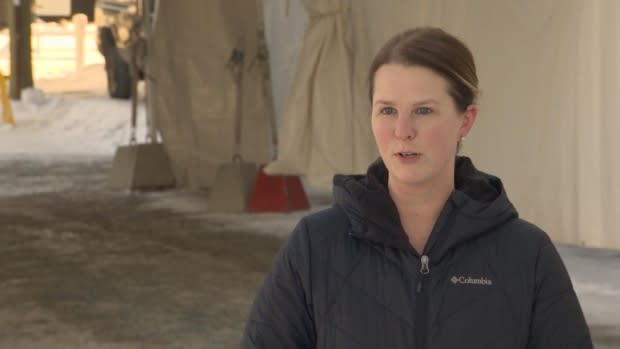1 week, 135 swabs and counting: Drive-thru COVID-19 testing underway in Yellowknife
Drive-thru COVID-19 testing is underway in Yellowknife.
Since last Tuesday, people experiencing symptoms have been able to get swabbed through the window of their vehicles by pulling into a large white tent set up in the parking lot behind the Primary Care Centre downtown.
The hope is that if testing is more accessible — if people don't even need to leave the comfort of their car to get a swab done — the risk of transmission will decrease, said Jenna Long, a registered nurse with the Northwest Territories Health and Social Services Authority.
What's more, said Long, "the risk for the health-care providers is hopefully lower because they are outside in the fresh air."
Drive-thru testing is now available in communities across Canada, from Kelowna B.C. to Summerside, P.E.I.

In its first week, Yellowknife's drive-thru clinic did 135 swabs.
As of Tuesday morning, a total of 910 tests had been completed in the N.W.T., and another 181 tests were awaiting results. There has been one confirmed case of COVID-19 in the territory.
Traffic through the outdoor testing centre has been pretty steady, said Long.
People can be assessed at the drive-thru for COVID-19 testing if they're between the ages of 12 and 60 and experiencing a cough, fever or shortness of breath, said Long. If they're outside those criteria, health-care workers may arrange an appointment for them at the COVID-19 clinic inside the Primary Care Centre.
How it works
Two people in personal protective equipment (gowns, gloves and eye protection) will approach each vehicle, said Long. The patient will be asked questions about their symptoms and when they began, and they'll have their oxygen levels and heart rate checked.
From there, said Long, it will be determined whether the patient can be swabbed from inside their vehicle, or whether they need a more in-depth assessment.
Long said the swab isn't painful, but, "[it] does go up into your nostril, so it's a little bit uncomfortable and maybe tickles a little bit."
While harsher weather conditions can be challenging, overall, Long said she's glad to be able to offer accessible testing.
"I don't know that it's ever a situation that we want to be in, but it's exciting to be a part of something that's being so well received by the community," she said. "It's something that's never been done before."

